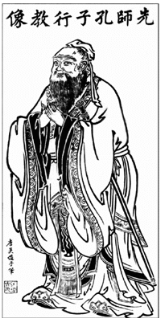Confucius literally "
Master Kong", (traditionally 28 September 551 BC – 479 BC) was a
ChineseChinese civilization may refer to:* China for more general discussion of the country.* Chinese culture* Greater China, the transnational community of ethnic Chinese.* History of China* Sinosphere, the area historically affected by Chinese culture...
thinker and social
philosopherEastern philosophy includes the various philosophies of Asia, including Chinese philosophy, Iranian philosophy, Japanese philosophy, Indian philosophy and Korean philosophy...
of the
Spring and Autumn Period.
The philosophy of Confucius emphasized personal and
governmentGovernment refers to the legislators, administrators, and arbitrators in the administrative bureaucracy who control a state at a given time, and to the system of government by which they are organized...
al
moralityMorality is the differentiation among intentions, decisions, and actions between those that are good and bad . A moral code is a system of morality and a moral is any one practice or teaching within a moral code...
, correctness of
social relationIn social science, a social relation or social interaction refers to a relationship between two , three or more individuals . Social relations, derived from individual agency, form the basis of the social structure. To this extent social relations are always the basic object of analysis for social...
ships,
justiceJustice is a concept of moral rightness based on ethics, rationality, law, natural law, religion, or equity, along with the punishment of the breach of said ethics; justice is the act of being just and/or fair.-Concept of justice:...
and
sinceritySincerity is the virtue of one who speaks and acts truly about his or her own feelings, thoughts, and desires.-Sincerity in Western societies:Sincerity has not been consistently regarded as a virtue in Western culture...
. These values gained prominence in
ChinaChinese civilization may refer to:* China for more general discussion of the country.* Chinese culture* Greater China, the transnational community of ethnic Chinese.* History of China* Sinosphere, the area historically affected by Chinese culture...
over other doctrines, such as
LegalismIn Chinese history, Legalism was one of the main philosophic currents during the Warring States Period, although the term itself was invented in the Han Dynasty and thus does not refer to an organized 'school' of thought....
or
TaoismTaoism refers to a philosophical or religious tradition in which the basic concept is to establish harmony with the Tao , which is the mechanism of everything that exists...
during the
Han DynastyThe Han Dynasty was the second imperial dynasty of China, preceded by the Qin Dynasty and succeeded by the Three Kingdoms . It was founded by the rebel leader Liu Bang, known posthumously as Emperor Gaozu of Han. It was briefly interrupted by the Xin Dynasty of the former regent Wang Mang...
(206 BC – AD 220).

![]()
![]()
![]()
![]()
![]()
![]()
![]()
![]()
![]()
![]()

